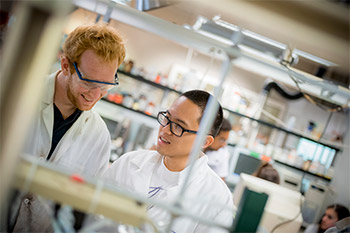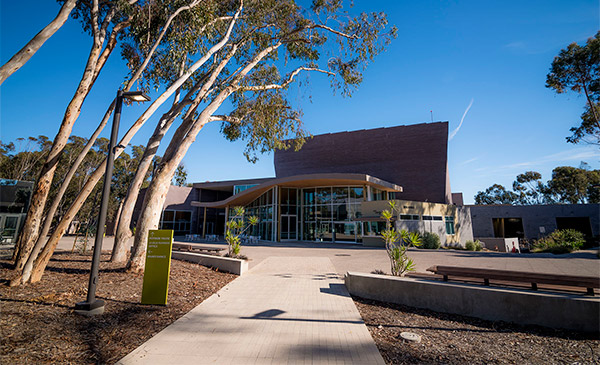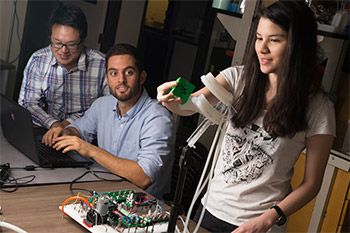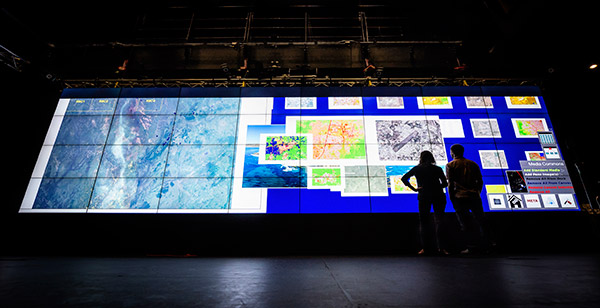Boosting Research that Benefits Society
October 29, 2015
Message from Chancellor Pradeep K. Khosla –
Letter Series: 2 of 3
It took five decades – and a legacy of excellence established by our founders – to build our stellar research university into one of the best in the world. Today, we are building on that tradition and success, and it is what motivates us to invest in initiatives that support our campus and broader community. Through our Strategic Plan, we’ve committed to advancing four grand research themes, areas where we have great depth and experience, from social and physical sciences to arts and humanities, and areas that have the most potential for positively impacting society and our planet. In this second letter of my three-letter series, I will talk about our recent research-focused achievements and investments, which allow us to provide educational experiences, opportunities for multidisciplinary collaboration and discovery, and the dissemination of our findings into real-world applications that transform lives.

UC San Diego once again surpassed $1 billion in research funding in 2014-15, a remarkable accomplishment that places us among the top five research universities in the nation. This is a credit to our faculty across disciplines – innovators and visionaries – who use their talent and expertise to advance the frontiers of knowledge, shape new fields and educate next-generation leaders. We want to spur interdisciplinary research, as well as reduce our student to faculty ratio in the classroom. That is why we are implementing a faculty growth plan to add 89 net new faculty to campus over a three-year period – including 20 joint positions – of which 23 have already been hired. It’s also why we created the Graduate Student Growth and Excellence Initiative, to expand our Ph.D. population and level out faculty costs for recruitments.
To further support our campus members who drive our research enterprise, we need facilities that foster collaborative work and education. Given the current landscape of government investment in higher education, we are working under a new funding model that will likely require campus investment in future instructional and research buildings. For example, UC San Diego will split the $120 million cost with the state to build our new Biological and Physical Sciences Building, which will be completed in 2018. This much-needed building will add research space and teaching laboratories to accommodate the growing demand for lab classes, as the number of students majoring in biology increased 64 percent between 2003-2013 and students majoring in chemistry and biochemistry increased 57 percent. This is part of our overall effort to address existing and future space needs across campus.

We are enhancing existing facilities and neighborhoods to enrich our scientific and intellectual communities. One example is the renovation and expansion of the Computer Science and Engineering Building, which was possible because of the philanthropic support of a UC San Diego alumnus. The project will soon transform the flow of the downstairs space to increase faculty and student interaction, and add teaching laboratories. A second example is the enrichment of UC San Diego’s Theatre District, which improves campus and community access, and provides a more welcoming and user-friendly experience. The expanded plaza unifies the open space of the district and is used for pre-function events, while the added signage and clearer walkways help patrons better navigate the area, which is especially beneficial for night performances. The reforestation of the district maintains the grove’s natural aesthetic. A third example is the recent complete renovation of the third floor of Muir Biology, which increased the number of laboratories from four to six, and created open shared areas that allow for interdisciplinary interaction among researchers. These revitalization efforts are critical to our faculty recruitment and retention efforts. Several new and existing faculty are already benefitting from the use of the renewed Muir Biology space, alongside their graduate and undergraduate students. They are investigating experimental evolution, synthetic biology of viruses, and the basis and regulation of plant innate immunity against insects and microbial pathogens. These are critical areas for our growing microbiome community and our recently announced UC San Diego Microbiome and Microbial Sciences Initiative, which works to further our understanding of the communities of bacteria, viruses and other microorganisms that live on our bodies and everywhere around us, so we can improve human and environmental health. This is an ambitious and important undertaking, and one that requires and utilizes technologies and expertise from multiple disciplines.

Looking ahead, we continue to foster our culture of collaboration by investing in futuristic academic initiatives– from an innovative hacker lab for quantitative biology and groundbreaking efforts in advanced energy and design, to the creation of a new Maker Space – to propel our work and attract additional research funding. The Maker Space will be both student-centered and research-focused, providing hands-on classes and opportunities that allow visual arts and engineering students to apply theory and practice to difficult real-world challenges. This experience prepares students for future internships and careers, enhances learning, and increases the impact of faculty teaching and engagement. We are excited about several new multidisciplinary institutes. The Contextual Robotics Institute at the Jacobs School of Engineering unites researchers from across campus and externally – from engineering and social sciences to industry partners – to develop the autonomous robotic systems of the future and establishes San Diego as a world-leading hub for robotics. The UC San Diego Global Health Institute and UC San Diego Institute for Public Health will harness brain power across campus to promote educational opportunities and use technological advances to address health concerns that impact the quality of life of people in San Diego and around the world. Through the new undergraduate global health major and minor, housed in the Division of Social Sciences, faculty are blending the hard sciences with social sciences and arts and humanities to give students a holistic education and practical field training. Additionally, our Frontiers of Innovation program has already seeded 200 multidisciplinary student-research projects with faculty and multiple interdisciplinary centers, including the UC San Diego Community Stations, which are field-based research and educational hubs where campus and community members in marginalized neighborhoods work together to address issues of diversity and social equity.

Creating and strengthening strategic alliances – locally and around the world – are keys to advance our research goals. UC San Diego has long been a partner with numerous institutions on the Torrey Pines Mesa. We recently strengthened research ties with the La Jolla Institute for Allergy and Immunology – to boost basic research of diseases of the immune system and more quickly introduce new clinical treatments and therapies – and The Scripps Research Institute to build unrivaled capabilities for mapping and computationally visualizing cells across a broad range of spatial and temporal scales. Another important collaboration, which has the goal of delivering innovative therapeutic products to patients, is the creation of the Innovation Alliance between the Sanford Consortium for Regenerative Medicine and Takeda Pharmaceutical Company Limited. To inspire the next generation of STEM leaders, we will reach even more students through our new association with Sally Ride Science, an organization that makes connections between what students are learning through hands-on experience and STEM careers. Sally Ride Science at UC San Diego will focus on professional development for teachers; K-12 STEM + Arts education including courses, lectures and events; and online programming via UCTV. UC San Diego’s CREATE STEM Success Initiative has had an amazing and productive first two years, supporting more than 200 distinct projects that leverage cross-campus resources to help K-20 students acquire STEM skills and strengthening partnerships in our region to better understand and meet students’ needs to prepare for college and careers. These efforts improve our outreach and impact, especially in underserved communities, and support our Strategic Plan goal to provide accessible and affordable learning for all.
Strategic alliances on and across campus foster our innovation culture as well. We’ve created the Office of Innovation and Commercialization, which unites several functions under one roof – technology transfer, intellectual property, innovation design and industry partnering. These relationships enable the sharing of resources, talent and ideas, which speeds research and delivery, and increases our positive impact on society. The Integrated Digital Infrastructure (IDI), established last year, provides new assistance to our faculty and researchers through partnerships and streamlined services, including technology advising and coordination of internal and external service providers. IDI assesses security, compliance and performance needs for research, and sponsors digital platforms that move UC San Diego to the next level of technology and research. IDI supported the San Diego Supercomputer Center with its hardware relocation service, which now provides no-cost faculty and staff use of the co-location facility for their computing hardware, frees up department space and drives more energy-efficient usage. To enhance data management and sharing, IDI launched the Research Data Library and supports the Research Data Curation Program at the UC San Diego Library, enabling faculty, staff and students to access services free of charge.
I have detailed just a few of the research-focused initiatives underway. Our support for these initiatives reflects our strong commitment to the research goals articulated in the Strategic Plan, and our commitment to campus members who fulfill our vision as a student-centered, research-focused, service-oriented public university.
With kind regards,
Pradeep K. Khosla
Chancellor